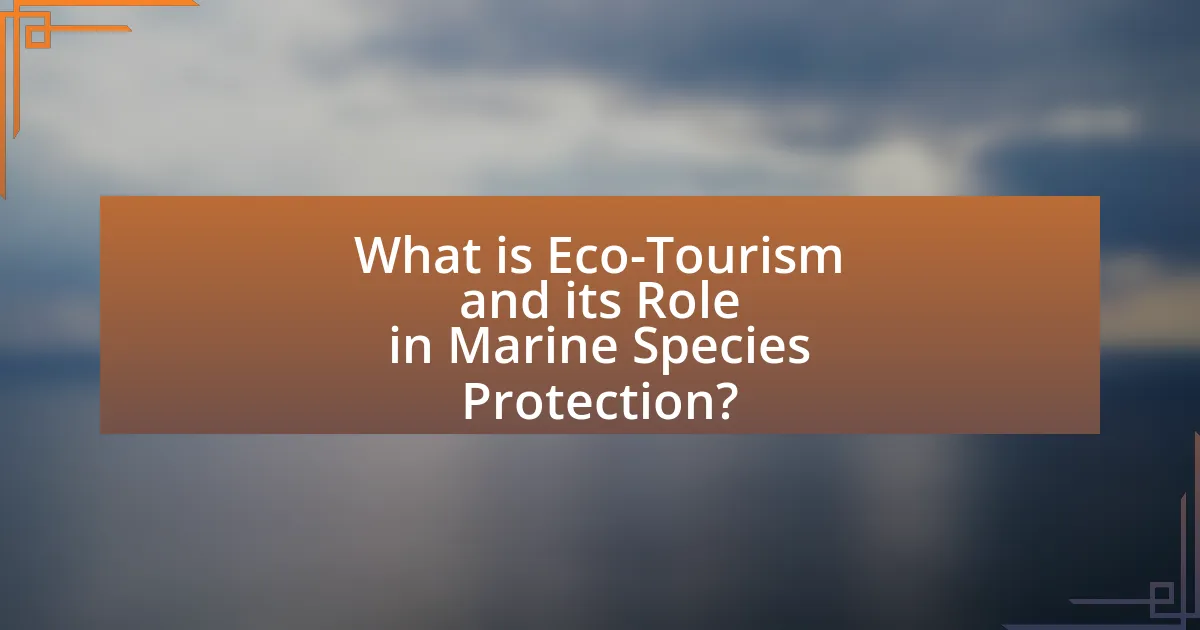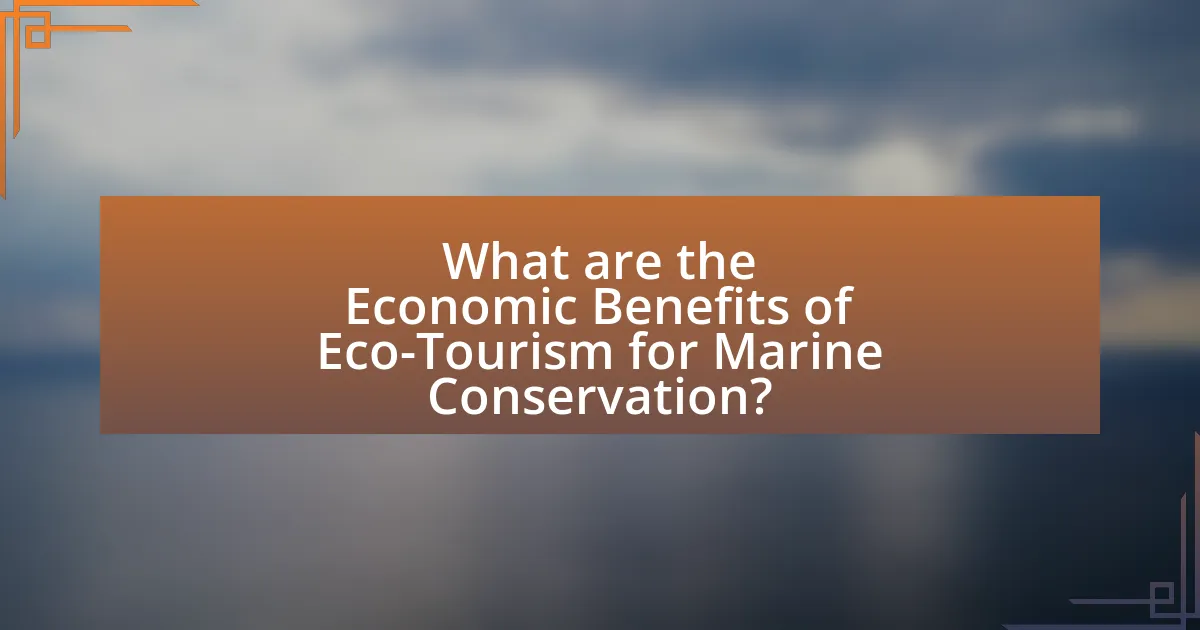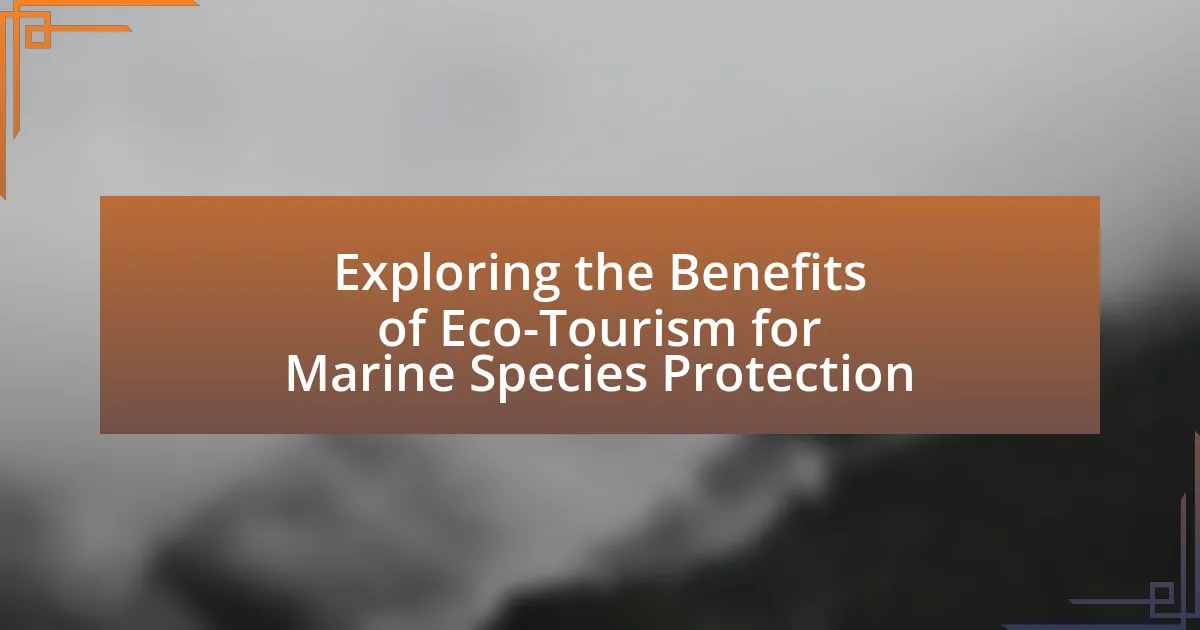Eco-tourism is a sustainable travel approach that emphasizes responsible interaction with marine ecosystems, playing a vital role in the protection of marine species. This article explores how eco-tourism contributes to marine conservation through practices such as responsible wildlife viewing, habitat restoration, and sustainable fishing. It highlights the economic benefits for local communities, the importance of raising awareness about marine conservation, and the challenges faced by eco-tourism initiatives. Additionally, the article discusses the potential negative impacts of eco-tourism on marine environments and outlines best practices for making eco-tourism more sustainable, ultimately underscoring the interconnectedness of eco-tourism and marine species protection.

What is Eco-Tourism and its Role in Marine Species Protection?
Eco-tourism is a sustainable travel approach that focuses on responsible interaction with natural environments, particularly in marine ecosystems. This form of tourism plays a crucial role in marine species protection by promoting conservation efforts, raising awareness about the importance of biodiversity, and generating funding for marine reserves. For instance, eco-tourism initiatives often include educational programs that inform visitors about marine life and the threats they face, such as overfishing and habitat destruction. Additionally, according to the World Wildlife Fund, eco-tourism can provide economic incentives for local communities to engage in conservation practices, thereby reducing harmful activities that threaten marine species.
How does eco-tourism contribute to the conservation of marine environments?
Eco-tourism contributes to the conservation of marine environments by promoting sustainable practices that protect marine ecosystems while providing economic incentives for local communities. This form of tourism often includes activities such as snorkeling, diving, and wildlife observation, which raise awareness about marine biodiversity and the importance of conservation efforts. For instance, a study by the World Wildlife Fund indicates that eco-tourism can generate significant revenue for coastal communities, encouraging them to preserve their natural resources rather than exploit them. Additionally, eco-tourism initiatives often fund conservation projects, such as coral reef restoration and marine protected areas, further enhancing the health of marine environments.
What specific practices in eco-tourism support marine species protection?
Specific practices in eco-tourism that support marine species protection include responsible wildlife viewing, habitat restoration, and sustainable fishing practices. Responsible wildlife viewing minimizes disturbances to marine life, ensuring that species such as dolphins and sea turtles can thrive in their natural habitats. Habitat restoration efforts, such as coral reef rehabilitation, directly contribute to the recovery of marine ecosystems, which are crucial for the survival of various marine species. Additionally, sustainable fishing practices, which limit catch sizes and protect breeding grounds, help maintain fish populations and biodiversity. These practices are supported by research indicating that eco-tourism can lead to improved conservation outcomes, as seen in studies conducted by the World Wildlife Fund, which highlight the positive impact of eco-tourism on marine biodiversity.
How does eco-tourism promote awareness about marine conservation?
Eco-tourism promotes awareness about marine conservation by providing educational experiences that highlight the importance of marine ecosystems. Through guided tours, workshops, and interactions with marine life, eco-tourism fosters a deeper understanding of the threats facing oceans, such as pollution and overfishing. Research indicates that eco-tourism can increase public engagement in conservation efforts; for instance, a study published in the Journal of Sustainable Tourism found that participants in eco-tourism activities reported a 70% increase in their knowledge about marine conservation issues. This heightened awareness often translates into advocacy for protective measures and sustainable practices, ultimately benefiting marine species and their habitats.
Why is marine species protection important in the context of eco-tourism?
Marine species protection is crucial in the context of eco-tourism because it ensures the sustainability of marine ecosystems, which are vital for attracting eco-tourists. Healthy marine environments support biodiversity, enhance visitor experiences, and contribute to local economies. For instance, a study by the World Wildlife Fund indicates that well-managed marine protected areas can increase fish populations by up to 600%, thereby improving the quality of eco-tourism activities such as snorkeling and diving. This relationship between marine species protection and eco-tourism underscores the importance of conservation efforts in maintaining both ecological balance and economic viability for communities reliant on tourism.
What are the threats faced by marine species today?
Marine species today face several significant threats, including climate change, overfishing, habitat destruction, pollution, and invasive species. Climate change leads to ocean warming and acidification, which adversely affect marine ecosystems and species survival. Overfishing depletes fish populations and disrupts food chains, while habitat destruction, such as coral reef degradation, diminishes essential breeding and feeding grounds. Pollution, particularly plastic waste and chemical runoff, poses direct harm to marine life and ecosystems. Invasive species can outcompete native species for resources, further threatening biodiversity. These threats collectively jeopardize the health and sustainability of marine environments.
How does eco-tourism help mitigate these threats?
Eco-tourism helps mitigate threats to marine species by promoting sustainable practices that reduce environmental impact. By encouraging responsible travel, eco-tourism fosters conservation efforts, such as habitat protection and restoration, which directly benefit marine ecosystems. For instance, eco-tourism initiatives often fund marine protected areas, leading to increased biodiversity and healthier fish populations. Additionally, eco-tourism raises awareness about marine conservation issues, motivating local communities and tourists to engage in protective measures. Studies have shown that regions with eco-tourism programs experience less overfishing and pollution, contributing to the overall resilience of marine species.

What are the Economic Benefits of Eco-Tourism for Marine Conservation?
Eco-tourism generates significant economic benefits for marine conservation by providing funding for conservation projects and creating sustainable livelihoods for local communities. This form of tourism often leads to increased revenue through entrance fees, guided tours, and local business support, which can be reinvested into marine protection efforts. For instance, a study by the World Wildlife Fund found that eco-tourism can contribute up to $1.5 billion annually to marine conservation initiatives globally. Additionally, eco-tourism promotes awareness and education about marine ecosystems, fostering a culture of conservation that can lead to long-term economic stability and environmental health.
How does eco-tourism generate revenue for marine conservation efforts?
Eco-tourism generates revenue for marine conservation efforts by attracting visitors who pay for experiences that promote environmental awareness and protection. These visitors contribute financially through activities such as guided tours, snorkeling, and diving, which often include fees that directly support local conservation projects. For instance, a study by the World Wildlife Fund indicates that eco-tourism can generate up to $1 billion annually for marine conservation initiatives globally. This revenue is then allocated to habitat restoration, species protection programs, and community education, ensuring sustainable practices that benefit both marine ecosystems and local economies.
What are the financial impacts of eco-tourism on local communities?
Eco-tourism generates significant financial benefits for local communities by providing income through tourism-related activities. This income often comes from eco-lodges, guided tours, and local crafts, which can lead to job creation and improved local economies. For instance, a study by the World Wildlife Fund indicated that eco-tourism can increase local income by up to 30% in areas where it is implemented effectively. Additionally, eco-tourism promotes sustainable practices that can enhance the long-term viability of local resources, ensuring that communities can continue to benefit financially from their natural surroundings.
How can eco-tourism funding be allocated to marine protection initiatives?
Eco-tourism funding can be allocated to marine protection initiatives by establishing dedicated grant programs that support conservation projects, habitat restoration, and community engagement. For instance, a portion of eco-tourism revenue can be directed towards marine protected areas (MPAs), which are essential for preserving biodiversity and ensuring sustainable fish populations. According to the World Bank, investing in MPAs can yield economic returns of up to $10 for every $1 spent, demonstrating the financial viability of such allocations. Additionally, partnerships with local communities can enhance the effectiveness of funding by promoting sustainable practices and fostering stewardship of marine resources.
What role do local communities play in eco-tourism and marine species protection?
Local communities play a crucial role in eco-tourism and marine species protection by actively participating in conservation efforts and promoting sustainable practices. Their involvement often leads to the preservation of marine habitats, as local knowledge and stewardship can enhance the effectiveness of conservation initiatives. For instance, communities that engage in eco-tourism can generate income through responsible tourism, which incentivizes them to protect marine ecosystems rather than exploit them. Research indicates that areas where local communities are involved in eco-tourism see a 20% increase in marine biodiversity due to reduced overfishing and habitat destruction. This demonstrates that local communities are not only stakeholders but also vital guardians of marine species and their habitats.
How can local communities benefit from eco-tourism initiatives?
Local communities can benefit from eco-tourism initiatives through economic development, job creation, and environmental conservation. Eco-tourism generates revenue by attracting visitors interested in natural and cultural experiences, which can lead to increased income for local businesses and services. For instance, a study by the World Tourism Organization found that eco-tourism can contribute up to 20% of the income for communities in biodiverse regions. Additionally, eco-tourism initiatives often promote sustainable practices that protect local ecosystems, ensuring that natural resources are preserved for future generations. This dual benefit of economic gain and environmental stewardship enhances community resilience and quality of life.
What are the challenges faced by local communities in eco-tourism?
Local communities in eco-tourism face several challenges, including economic dependency, cultural erosion, and environmental degradation. Economic dependency arises when communities rely heavily on tourism revenue, making them vulnerable to fluctuations in visitor numbers. Cultural erosion occurs as traditional practices and lifestyles may be overshadowed by the demands of tourists, leading to a loss of cultural identity. Environmental degradation can happen when tourism activities exceed the carrying capacity of local ecosystems, resulting in habitat destruction and pollution. These challenges highlight the need for sustainable practices to ensure that eco-tourism benefits both local communities and the environment.

What are the Challenges and Limitations of Eco-Tourism for Marine Species Protection?
Eco-tourism presents several challenges and limitations for marine species protection, primarily due to the potential for habitat degradation, increased human disturbance, and inadequate regulatory frameworks. Habitat degradation occurs when tourist activities, such as snorkeling or boating, damage sensitive marine environments like coral reefs, which are crucial for biodiversity. Increased human disturbance can lead to stress in marine species, disrupting their natural behaviors and breeding patterns. Furthermore, many eco-tourism initiatives lack robust regulations and monitoring, resulting in unsustainable practices that can undermine conservation efforts. For instance, a study published in the journal “Marine Policy” highlights that poorly managed eco-tourism can lead to overfishing and pollution, further threatening marine ecosystems.
What are the potential negative impacts of eco-tourism on marine ecosystems?
Eco-tourism can negatively impact marine ecosystems through habitat degradation, pollution, and disturbance to wildlife. Activities such as snorkeling, diving, and boat tours can lead to coral reef damage, as physical contact and anchor damage disrupt the delicate structures. Additionally, increased human presence often results in litter and waste, contributing to water pollution that harms marine life. Research indicates that noise pollution from boats can interfere with the communication and breeding behaviors of marine species, further stressing these ecosystems.
How can eco-tourism practices lead to environmental degradation?
Eco-tourism practices can lead to environmental degradation through increased foot traffic, habitat disruption, and resource depletion. When large numbers of tourists visit sensitive ecosystems, such as coral reefs or coastal areas, the physical presence of people can damage fragile habitats. For instance, studies have shown that coral reefs can suffer from physical damage due to snorkeling and diving activities, which can lead to a decline in marine biodiversity. Additionally, eco-tourism often requires infrastructure development, such as roads and accommodations, which can result in habitat loss and fragmentation. Furthermore, the demand for local resources, such as water and food, can strain ecosystems, leading to overexploitation and pollution. These factors collectively contribute to the degradation of the very environments that eco-tourism aims to protect.
What measures can be taken to minimize the negative impacts of eco-tourism?
To minimize the negative impacts of eco-tourism, implementing strict regulations and guidelines for tourist activities is essential. These regulations can include limiting visitor numbers in sensitive areas, enforcing designated pathways to prevent habitat destruction, and establishing codes of conduct for interactions with wildlife. Research indicates that areas with visitor limits experience less environmental degradation, as seen in the Galápagos Islands, where strict visitor controls have helped preserve biodiversity. Additionally, promoting community involvement in eco-tourism initiatives ensures that local populations benefit economically, which can lead to better conservation practices. Studies show that when local communities are engaged, there is a higher likelihood of sustainable practices being adopted, as evidenced by successful eco-tourism projects in Costa Rica.
How can eco-tourism be made more sustainable for marine conservation?
Eco-tourism can be made more sustainable for marine conservation by implementing strict regulations on visitor numbers and activities to minimize environmental impact. For instance, limiting the number of tourists in sensitive marine areas can reduce habitat degradation and stress on wildlife. Research indicates that over-tourism can lead to significant declines in marine biodiversity, as seen in the Great Barrier Reef, where coral bleaching has been exacerbated by increased human activity. Additionally, promoting educational programs that raise awareness about marine ecosystems and conservation efforts can foster responsible behavior among tourists, encouraging practices that protect marine life. Studies show that eco-tourism initiatives that include local communities in decision-making processes lead to better conservation outcomes, as they often have a vested interest in preserving their natural resources.
What best practices should eco-tourism operators follow?
Eco-tourism operators should prioritize sustainability, conservation, and community engagement as best practices. Sustainability involves minimizing environmental impact by using eco-friendly materials and practices, such as renewable energy sources and waste reduction strategies. Conservation efforts should focus on protecting local ecosystems and wildlife, which can include supporting marine protected areas and participating in research initiatives that monitor species health. Community engagement is essential; operators should collaborate with local communities to ensure that tourism benefits them economically and socially, fostering a sense of stewardship for natural resources. These practices are supported by studies indicating that eco-tourism can enhance biodiversity conservation and improve local livelihoods, as evidenced by the success of eco-tourism initiatives in places like Costa Rica, where tourism revenue directly supports conservation efforts.
How can tourists contribute to sustainable eco-tourism practices?
Tourists can contribute to sustainable eco-tourism practices by choosing eco-friendly accommodations and participating in conservation activities. By selecting lodgings that prioritize sustainability, such as those using renewable energy and minimizing waste, tourists support businesses that align with eco-tourism principles. Additionally, engaging in activities like beach clean-ups or wildlife monitoring directly aids in the protection of marine species and their habitats. Research indicates that eco-tourism can lead to increased funding for conservation efforts, with a study by the World Wildlife Fund showing that eco-tourism can generate up to $600 billion annually, providing essential resources for marine conservation initiatives.
What are some practical tips for engaging in eco-tourism that supports marine species protection?
Engaging in eco-tourism that supports marine species protection involves choosing responsible travel practices that minimize environmental impact. Travelers should select eco-friendly tour operators that prioritize conservation efforts, such as those certified by organizations like the Rainforest Alliance or the Global Sustainable Tourism Council. Participating in guided tours that educate visitors about local marine ecosystems and species can enhance awareness and appreciation, fostering a commitment to protection. Additionally, avoiding activities that harm marine life, such as feeding wildlife or purchasing souvenirs made from endangered species, is crucial. Supporting local communities through sustainable practices, such as staying in eco-lodges and consuming locally sourced food, contributes to the economic viability of conservation efforts. Research indicates that eco-tourism can lead to increased funding for marine conservation initiatives, as seen in the Coral Triangle region, where eco-tourism has helped fund marine protected areas.
